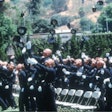
To become a full-fledged police officer, you must first suffer the hiring and background gauntlet. Then you must pass the tests to get hired. Once you make it through the academy, you'll be sworn in. You're still not there yet!
As the Fabulous New Guy (FNG) in the Field Training Officer (FTO) program, you're not out of the woods yet! I don't know the duration of your particular FTO program or your probationary period, because each department is different. If you're still under the FTO umbrella and probationary period, you still have ample time to screw up and lose it all. You may not be fired, but you'll suffer the consequences.
Your supervisors will give you evaluations—either daily, weekly, or monthly. Please take them seriously. I may sound like your old high school principal, but I must remind you that these are on your "permanent record." Don't think these evaluations are something temporary or trivial. Treat them as a serious record of your training, progress, and development into an officer.
Through my years of dealing with rookies, I've read far too many cavalier statements by either brash or totally unwitting rookies. Here are the most common ones that you'll want to avoid.
"Yeah, been there, done that."
This recruit was trying to relay with confidence that he had performed this task or responded to this type of call several times. The recruit should have stated, "I have performed this task under training conditions, under stress, and in the field with positive results." Confidence is one thing, over familiarity is another. Arrogance breeds contempt.
"Whatever."
Don't even think of writing this one down as a response on a document. This signals the writer's belief in the ultimate unimportance of the matter at hand. This one word is flippant and shows a total disregard toward the supervisor or trainer. We need to get this student's behavior compass back on course. I have never really believed in the word "attitude." It's not your attitude that's negative or positive. It's your behavior to the response that is positive or negative. I can't address attitude as a trainer or supervisor, but I can address negative behavior.
"If this is important to you..."
This recruit may believe this training element or performance requirement isn't important. Last time I checked the trainers, FTOs, and supervisors set the training path and curriculum, not the student. As officers, we must respond to infinitesimal varieties of calls for service. If you deem a call beneath you, the great gods of Policeland will direct a few more your way. They have a sense of humor. Train for all possibilities and the reality that you will have to manage one at one time in your career.
"That will never happen here."
All great FTOs will give you scenarios to train for. A screamin' zombie attack may be far fetched, but most training scenarios are based on real, local examples that your training staff has encountered. Don't discount what you feel is out of realm of possibilities. Train hard, and train smart. Whatever you do, don't write anything on an evaluation that you'll live to regret.
Are there other snippy remarks that a recruit can write down to dampen their progress? Absolutely, there are many out there that we can all share. The point of this is two fold. For the recruits, take your evaluations seriously and view them as career path prescription.
It's difficult to take direction, but we must do this. Catty remarks may offer insights to a bigger issue.
Related:


















